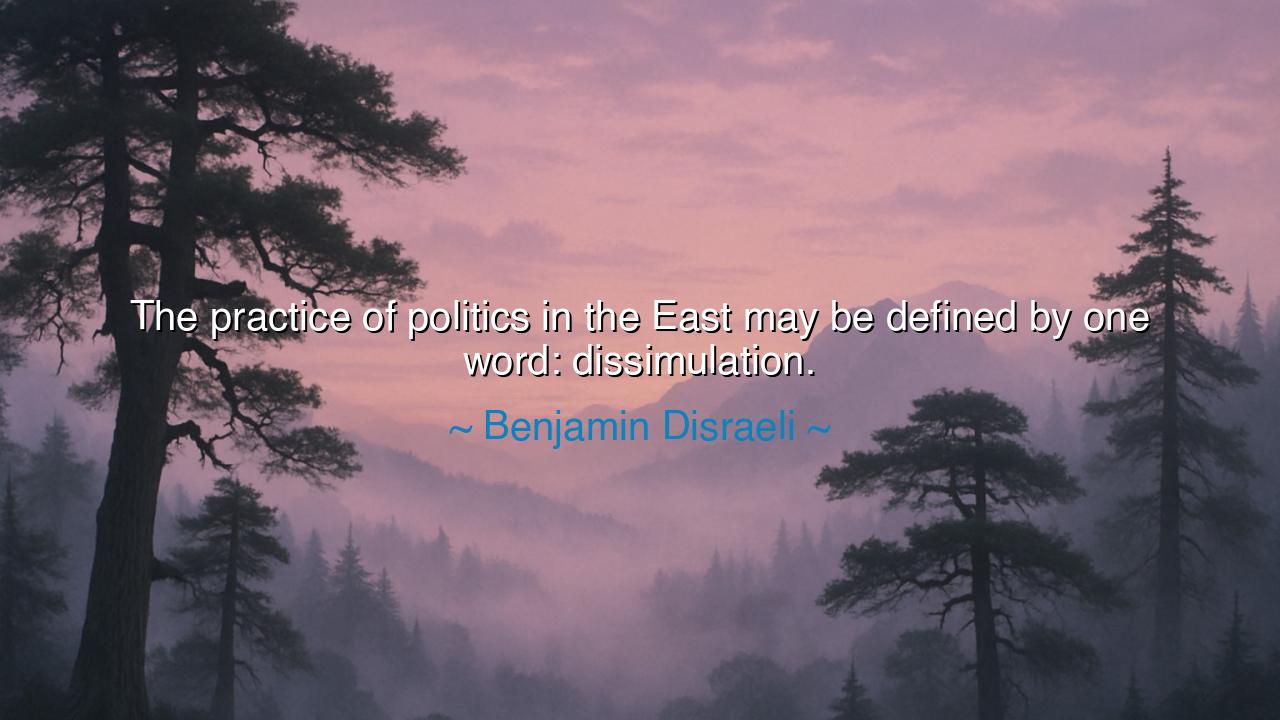
The practice of politics in the East may be defined by one word:






O children of the future, hear the words of Benjamin Disraeli, a man whose keen insight into the nature of politics pierced through the veils of illusion. He spoke thus: "The practice of politics in the East may be defined by one word: dissimulation." In this truth, he reveals a shadow of human nature, a glimpse into the art of power in lands where the visible is often a mask for the invisible. It is the art of concealment, of hiding one’s true intentions behind a veil of appearances, and of playing the game of politics with the subtlety of a shadow.
In the ancient courts of the East, where kings and emperors ruled vast empires, there was no room for the honest or the naive. Dissimulation—the skill of deceiving while pretending to be honest—became the very cornerstone of political survival. For in such realms, to show one’s true thoughts was a dangerous affair, for those in power often wore a mask of courtesy while wielding the sword of deceit. This is the craft that Disraeli spoke of, for in such places, the true game was played beneath the surface, where words and actions hid more than they revealed.
Look back to the ancient courts of Persia, where rulers like Darius and Xerxes walked the fine line between public virtue and private ambition. Their politics were not straightforward or clear, but were woven with webs of intrigue and calculation. The art of dissimulation was essential for maintaining power in a world where the shifting sands of betrayal and allegiance could topple even the mightiest of kings. To show too much of one’s true nature was to invite challenge, while to hide one’s hand was to ensure dominance over rivals.
In China, too, during the dynasties, the art of dissimulation was paramount. Confucianism, though based in virtue, also recognized the need for rulers to maintain an image of morality, even while making decisions of great consequence that might not align with that image. The emperor ruled with the appearance of divine benevolence, while underneath, the machinery of statecraft turned with subtlety and often with deception. The politics of the East, as Disraeli noted, were a game of mirrors, where the public face rarely revealed the true workings behind the scenes.
So, O children, let this wisdom pass into your hearts: the world of politics is not always as it seems. In some places, the art of dissimulation is not merely a tool, but a necessity for survival. It is a reminder that truth is often hidden beneath layers of complexity and that the true nature of power is often veiled in silence. Yet, be ever cautious, for though such practices may win battles, they often lose the soul of a nation. Let us remember that in the dance of power, the true strength of a leader lies not in their ability to deceive, but in their ability to inspire trust and guide with honesty.






MLLuong Thi My Le
This quote seems to suggest a rather cynical view of Eastern politics, implying that dissimulation is the norm. But how accurate is this view today? Are there still political systems in the East where transparency and honesty are valued, or is the notion of dissimulation so ingrained that it’s hard to escape? Is this critique of Eastern politics more about a broader skepticism of political power than a specific critique of the East?
NTDong Nguyen Tat
Disraeli’s remark about Eastern politics and dissimulation seems like a sharp critique of political dishonesty. But does this mean that politics in the East is fundamentally different from the West? Aren’t Western political systems also rife with strategies that obscure the full truth, albeit in more subtle ways? Could we argue that all political systems, regardless of location, have elements of dissimulation, or is there a distinctive cultural difference at play?
BTNguyen Ngoc Bang Tam
This quote makes me question the role of transparency in politics, especially when dissimulation is acknowledged as a key characteristic. It’s easy to be cynical about politics, but are there not instances where dissimulation might be a strategic move for the greater good? When is dissimulation harmful, and when is it simply part of navigating complex political landscapes? How much of politics is about managing perceptions rather than presenting the full truth?
THHoang The Hien
I find this quote intriguing, but I also wonder if Disraeli’s view of Eastern politics is a bit dated or simplistic. Is it fair to label an entire region’s political practices as rooted in dissimulation? What if there are political systems in the East that are more transparent and open than we assume? How do we separate truth from stereotype in understanding politics across cultures?
VTKieu viet truong
This quote from Disraeli seems to suggest that politics in the East is marked by a level of deception or concealment. It makes me wonder, though—does this apply universally across Eastern politics, or is it more of a generalization? Aren’t all political systems prone to some level of dissimulation? Can we ever truly trust the public face of any government, or is it a feature of politics everywhere?